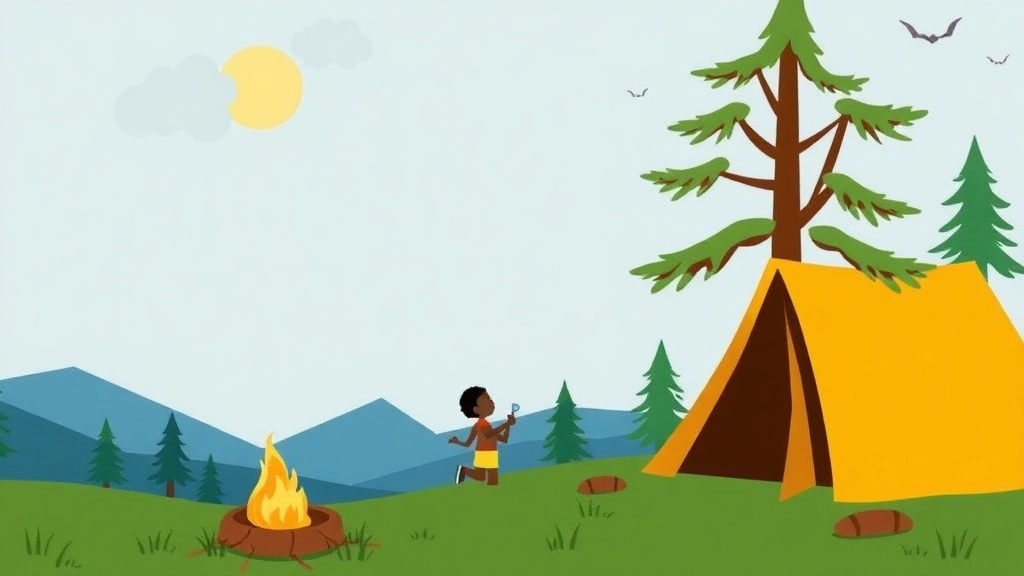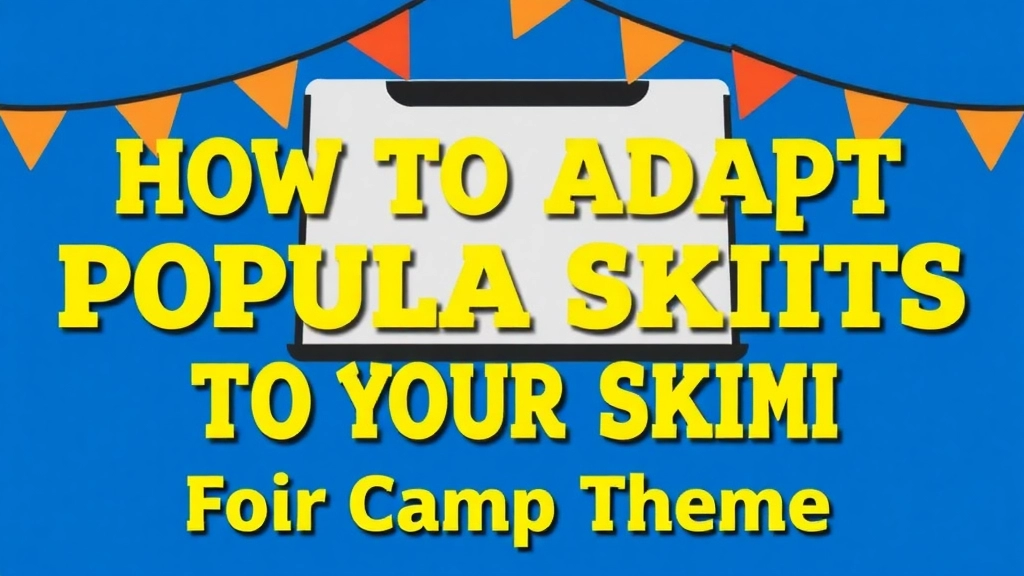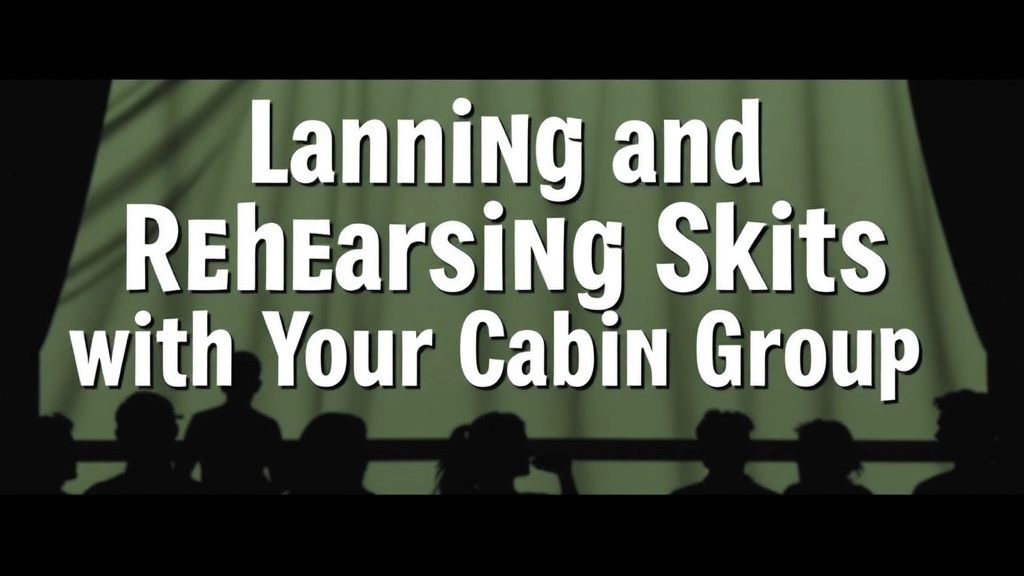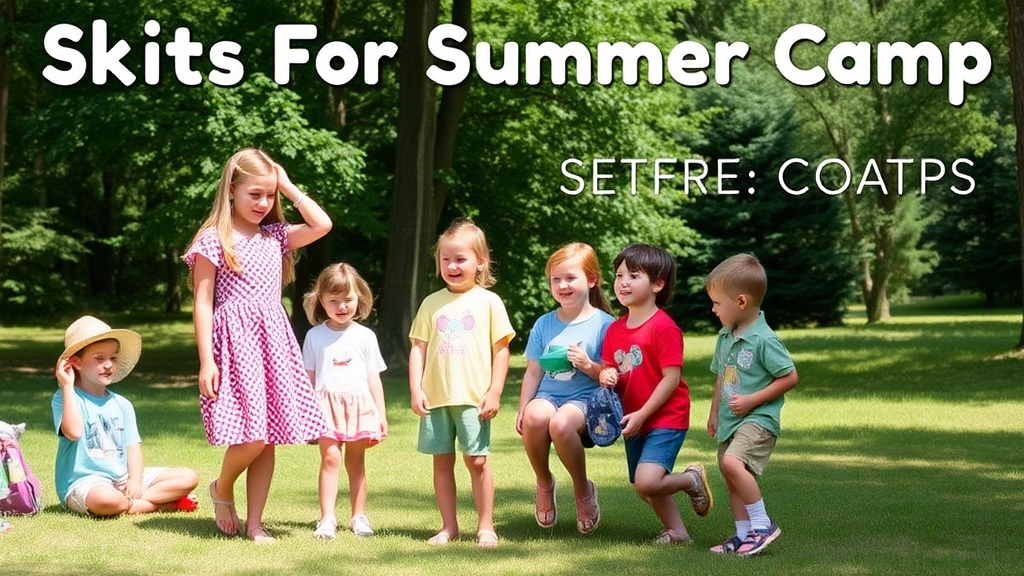Campfire Skits for Summer Camp
Campfire evenings at summer camp are the perfect setting for skits that bring everyone together, offering laughter, fun, and unforgettable memories. This article dives into the best skits for campfire evenings, from funny and easy skits for young campers to classic camp skits that never get old. We’ll explore how to adapt popular skits to fit your camp theme and provide tips for engaging shy campers in performances. Whether you’re looking for quick skits to fill time between activities or moral and educational skits for camp programs, we’ve got you covered.
From planning and rehearsing skits with your cabin group to creative skit ideas for last-minute campfire fun, this guide offers a comprehensive look at making your campfire evenings a hit. You’ll find ideas that encourage audience participation, tips for making skits shine, and strategies to help shy campers step into the spotlight. Get ready to create campfire moments that campers will talk about for years to come with our ultimate guide to skits for summer camp.
Best Skits for Campfire Evenings
Alright, let’s get straight to it. Picture this: It’s the end of a long, activity-packed day at camp. The sun’s setting, the fire’s crackling, and everyone’s gathered around, ready for some laughs and fun. But here’s the kickerâwhat skits are going to hit the mark and make the evening unforgettable?
Why Campfire Skits Matter
First off, let’s address why campfire skits are a big deal. They’re not just filler; they’re the glue that brings everyone together, creating memories that stick. You want skits that are:
- Engaging: They should grab attention from the get-go.
- Inclusive: Everyone should feel like they can join in.
- Memorable: Think about the stories campers will tell when they get home.
Top Picks for Campfire Skits
Here are some of the best skits that tick all the boxes:
The Invisible Bench
- Setup: A group of campers pretends there’s an invisible bench.
- Punchline: One by one, they “sit” on it until the last person says, “What are you all doing sitting on my invisible bench?” and “moves” it, causing everyone to fall.
- Why it works: Simple, funny, and easy to pull off.
Doctor, Doctor!
- Setup: A camper acts as a doctor, while others come in with ridiculous ailments.
- Punchline: The doctor gives absurd but hilarious advice.
- Why it works: Encourages creativity and improvisation.
If I Were Not a Camper
- Setup: Campers line up and sing about what they’d be if they weren’t at camp.
- Punchline: Each line ends with a funny action or sound.
- Why it works: It’s interactive and can be tailored to any group.
Making Skits Shine
Now, let’s talk about how to make these skits really pop. Here are some tips:
- Rehearse, but don’t overdo it: You want it to be natural and fun, not robotic.
- Props and Costumes: Even simple props can elevate a skit. A hat, a stick, or a blanket can make a world of difference.
- Audience Engagement: Get the audience involved. Ask them to make sound effects or be part of the scene.
Real Concerns, Real Solutions
I know what you’re thinking. “What if my campers are too shy?” or “What if the skit flops?” Here’s the deal:
- For shy campers: Start with small roles and build their confidence. Encourage them without pressure.
- If a skit flops: Laugh it off. The key is to keep the energy positive. Sometimes the best moments come from unexpected mishaps.
For more ideas on how to keep your campers engaged, check out our top summer camp board games and summer camp craft ideas.
Funny and Easy Skits for Young Campers

Ever tried to get young campers to perform a skit?
It can be like herding cats.
But don’t worry, I’ve got you covered with some funny and easy skits that even the shyest camper will love.
Why Choose Easy Skits?
Young campers can get overwhelmed.
They need something simple and fun.
Here’s why easy skits work:
- Short and Sweet: Keeps their attention.
- Simple Lines: Easy to remember.
- Big Laughs: Who doesn’t love a good giggle?
Top Skit Ideas
The Invisible Bench
A classic that never fails.
- Setup: One camper pretends to sit on an invisible bench.
- Action: Others join, pretending to sit too.
- Punchline: The first camper walks away, and everyone “falls.”
The Interrupting Chicken
Perfect for giggles.
- Setup: One camper tells a story.
- Action: Another keeps interrupting with a loud “BAWK!”
- Punchline: The storyteller gets frustrated in a funny way.
The Magic Box
Simple and magical.
- Setup: A box that makes funny noises.
- Action: Campers pull out imaginary items.
- Punchline: Each item is sillier than the last.
Getting Campers Involved
Engaging young campers can be tricky.
Here’s how I do it:
- Role Assignment: Let them choose roles.
- Practice Time: Keep it short and fun.
- Encouragement: Cheer them on!
Real-Life Example
Last summer, I had a group of shy campers.
We tried “The Invisible Bench.”
They loved it.
Laughter echoed around the campfire, and even the quiet ones joined in.
Funny and easy skits are your secret weapon.
Use them wisely!
Skits with Audience Participation
Ever been to a campfire where the audience is more interested in their marshmallows than the skits? Yeah, not fun. That’s why skits with audience participation are a game-changer. They pull everyone in, making sure even the shyest camper feels like part of the action. Let’s dive into how you can make your campfire evenings unforgettable with these interactive skits.
Why Audience Participation Rocks
First off, let’s talk about why you need audience participation in your skits. Here’s the deal:
- Engagement: Keeps everyone hooked from start to finish.
- Involvement: Gives everyone a role, even if it’s just clapping or shouting a line.
- Memorable: Creates moments that campers will talk about for years.
Simple Ideas to Get Everyone Involved
You don’t need a Hollywood script to pull off a killer skit. Here are some easy ways to get the audience in on the fun:
- Call and Response: Have parts of the skit where the audience has to shout back a line.
- Interactive Props: Hand out simple props to the audience and cue them when to use them.
- Choose-Your-Adventure: Let the audience decide what happens next in the skit.
Example: The “Echo” Skit
One of my all-time favourites is the “Echo” skit. It’s simple, hilarious, and gets everyone involved. Here’s how it works:
- Setup: One camper plays the “Echo” in the background.
- Script: The main character shouts something, and the Echo repeats it in a funny way.
- Audience Role: The audience can suggest what the main character should shout next.
Pro Tips for Nailing It
Alright, you’ve got your skit idea. Now, let’s make sure it goes off without a hitch:
- Practice: Run through the skit a couple of times with your campers.
- Clear Instructions: Make sure the audience knows when and how to participate.
- Energy: Keep the energy high. If you’re pumped, the audience will be too.
Real Stories, Real Fun
Let me tell you about the time we did the “Echo” skit at our camp. We had this one shy camper, Tim, who never wanted to participate. But when he saw how much fun everyone was having, he jumped in and ended up being the star of the night. The whole camp was roaring with laughter, and Tim walked away with a newfound confidence.
If you’re looking for more ways to keep your campers engaged, check out our summer camp activities and our fun camp pranks for every camper. These ideas will ensure your camp is the highlight of everyone’s summer!
Moral and Educational Skits for Camp Programs

Ever noticed how kids light up when they learn something new through fun? That’s the magic of moral and educational skits for camp programs.
Why Bother with Moral and Educational Skits?
Because kids remember stories. They remember the laughs, the lessons, and the moments that tug at their hearts.
Plus, it’s a sneaky way to teach them important values without sounding like a boring lecture.
Key Elements of a Good Moral Skit
- Relatable Characters: Think about characters kids can see themselves in. Maybe it’s a shy camper who learns to speak up or a mischievous one who learns the value of honesty.
- Clear Lesson: Don’t overcomplicate it. The lesson should be clear and straightforward.
- Humour: Keep it light. A bit of humour goes a long way in making the lesson stick.
- Engaging Plot: A good story has a beginning, middle, and end. Keep the kids hooked from start to finish.
Examples of Moral and Educational Skits
- The Honest Camper: A camper finds a lost item and faces the dilemma of keeping it or turning it in. This skit teaches honesty and integrity.
- The Team Player: A skit where a camper learns the importance of teamwork during a camp challenge. Perfect for teaching cooperation.
- The Bully and the Brave: A story about standing up to bullies and being kind to others. This one hits home with lessons on bravery and kindness.
How to Make It Work
- Keep It Short: Kids have short attention spans. Aim for 5-10 minutes.
- Interactive Elements: Get the audience involved. Maybe they help the character make a decision.
- Practice Makes Perfect: Rehearse a few times so the kids feel confident.
Pro Tip: Tailor the Skit to Your Camp’s Theme
If your camp has a specific theme, weave it into the skit. It makes the experience more cohesive and memorable.
Engaging Shy Campers
- Small Roles: Give them small, manageable roles to build confidence.
- Encouragement: Positive reinforcement goes a long way.
- Pairing Up: Pair shy campers with more outgoing ones to help them feel supported.
Real-Life Example
Last summer, we did a skit called “The Lost Treasure.” It was about a group of campers who find a map and work together to find a hidden treasure. Along the way, they learned about teamwork, honesty, and perseverance. The kids loved it, and they talked about it for days!
Classic Camp Skits That Never Get Old
Are you racking your brain trying to find the perfect skit for your next campfire evening? Trust me, I get it. You want something that’s a guaranteed hit, something that’ll have everyone laughing and coming back for more. Well, you’re in luck because classic camp skits are like the Swiss Army knife of campfire entertainmentâthey never get old, and they always deliver.
Why Classic Skits Are Timeless
First off, these skits have stood the test of time for a reason. They’re simple, hilarious, and easy to pull off. Plus, they often come with a built-in nostalgia factor that makes everyone feel like a kid again. Let’s break it down:
- Simplicity: No need for elaborate props or costumes.
- Humour: The jokes are straightforward and universally funny.
- Nostalgia: They bring back fond memories for both campers and leaders.
Must-Try Classic Camp Skits
Here are a few skits that have been crowd-pleasers for generations:
- The Invisible Bench: Two people mime sitting on an “invisible bench.” More people join in, and finally, someone asks what they’re doing. The first person says, “We’re sitting on this invisible bench,” and then moves. Everyone falls down.
- The Toothpaste Skit: One camper pretends to be a tube of toothpaste, and another camper “squeezes” them to get the paste out. It’s messy, it’s fun, and it’s always a hit.
- The Lost Quarter: Someone pretends to lose a quarter, and everyone helps to find it. The twist? The quarter is stuck to the searcher’s forehead all along.
Tips to Make Classic Skits Your Own
You might think, âThese skits are great, but how do I make them fresh for my group?â Here’s how:
- Add a Modern Twist: Incorporate current slang or pop culture references.
- Customise for Your Group: Include inside jokes or camp-specific elements.
- Interactive Elements: Get the audience involved by asking them to suggest lines or actions.
Real-Life Example
Last summer, we pulled off “The Invisible Bench” skit at our campfire, but we added a twist. Instead of just falling down, we had a hidden bucket of water that splashed the campers when they “fell.” The kids went wild! It was the highlight of the evening.
Wrapping It Up
In conclusion, classic camp skits are a must-have for any campfire evening. They’re easy to perform, guaranteed to get laughs, and can be adapted to fit any group. So, next time you’re planning your campfire activities, don’t overlook these timeless gems. Trust me, they never get old.
For more ideas on how to keep your campfire evenings lively, check out our section on top games to play at summer camp or summer camp culture, activities, and traditions.
Remember, the key to a memorable campfire evening is keeping it real, keeping it fresh, and most importantly, keeping it engaging. Happy skit planning!
How to Adapt Popular Skits to Fit Your Camp Theme

Ever found yourself wondering how to make a popular skit work for your camp’s unique theme?
Yeah, me too.
It’s not as hard as it sounds.
Here’s the deal: You’ve got a skit that everyone loves, but it doesn’t quite fit your camp’s vibe.
No worries.
You can tweak it to make it a perfect match.
Here’s how:
Start with the Basics
First, understand the core of the skit.
What’s the main storyline?
Who are the characters?
What’s the punchline or moral?
Identify Your Camp Theme
Next, get clear on your camp’s theme.
Is it nature-focused?
Adventure?
Science fiction?
Knowing this helps you align the skit.
Make Simple Swaps
Replace characters with ones that fit your theme.
For example, if the original skit has superheroes, swap them out for forest rangers or astronauts.
Change the setting to match your camp environment.
A city scene can become a forest, a spaceship, or even a medieval castle.
Add Themed Props and Costumes
Props and costumes can do wonders.
Use items that reflect your camp’s theme.
Got a nature theme?
Think leaves, sticks, and animal masks.
For a space theme?
Use tinfoil, cardboard rockets, and alien antennas.
Tailor the Dialogue
Update the script to include references to your camp activities.
If your camp focuses on survival skills, throw in some jokes about building shelters or starting fires.
Keep It Interactive
Engage your audience by adding elements that involve them.
Ask questions related to your theme.
Get them to make sound effects or vote on what happens next.
Test and Tweak
Do a quick run-through with your campers.
See what works and what doesn’t.
Don’t be afraid to make changes on the fly.
Real-Life Example
Last summer, we had a pirate-themed camp.
We took the classic “Doctor, Doctor” skit and turned it into “Captain, Captain.”
Instead of ailments, the pirates had problems like “I’ve lost my parrot” or “My treasure map is missing.”
The kids loved it, and it felt like it was made just for our camp.
Quick Recap
- Understand the original skit
- Identify your camp theme
- Swap characters and settings
- Use themed props and costumes
- Tailor the dialogue
- Keep it interactive
- Test and tweak
Adapting skits to fit your camp theme doesn’t have to be a chore.
It’s all about creativity and a little bit of effort.
And trust me, the payoff is worth it.
Your campers will be talking about it for days.
So, go ahead, give it a shot.
You’ll be amazed at how well a simple tweak can transform a skit into something magical for your camp.
Quick Skits for Filling In Between Camp Activities
Ever been at camp and needed something fun to fill the time between activities? Quick skits are the perfect solution. These short performances can bring a lot of laughter and energy to any camp setting. They’re easy, fun, and require minimal preparation. Let’s dive into how you can make the most of these impromptu performances.
Why Quick Skits?
At camp, there’s always that awkward gap between activities. Maybe the hike ended early, or the rain cancelled your swim. Quick skits are your go-to for keeping the energy high and everyone entertained. Plus, they’re a fantastic way to bring everyone together without much fuss.
What Makes a Skit “Quick”?
Here’s what I look for in a quick skit:
- Short Duration: Aim for 5 minutes or less.
- Simple Plot: Keep it straightforward. No complex backstories.
- Minimal Props: Use what’s around you or nothing at all.
- Flexible Cast: Can be performed by any number of people.
Ideas for Quick Skits
- Invisible Bench: A classic! One person pretends to sit on an “invisible bench,” and others join in, sitting beside them. The punchline? The last person says, “I moved the bench yesterday!”
- The Vending Machine: One camper acts as a vending machine, while others insert imaginary coins and request items. The “machine” then hilariously dispenses the requested item.
- Echo Skit: Great for audience participation. One person says something, and the rest echo it back in a funny way. Simple and effective.
Tips for Performing Quick Skits
- Be Spontaneous: Don’t over-rehearse. The charm is in the spontaneity.
- Keep It Light: Avoid complex themes. Stick to humour and fun.
- Engage the Audience: Involve them in the skit. Ask questions or get them to repeat lines.
Real Stories from Camp
I remember one rainy afternoon at camp when we were stuck indoors. We threw together a quick skit about a “haunted” campfire that had everyone in stitches. It was simple, goofy, and exactly what we needed to lift our spirits.
Planning Your Quick Skits
- Brainstorm with Your Group: Get everyone involved in coming up with ideas.
- Assign Roles Quickly: Decide who’s doing what on the spot.
- Practice Once: A quick run-through is all you need.
Engaging Shy Campers
Even the shyest campers can shine in quick skits. Here’s how:
- Start Small: Give them a minor role or a simple line.
- Encourage Creativity: Let them come up with their own ideas or characters.
- Praise Participation: Celebrate every effort, no matter how small.
If you’re looking for more structured activities, consider checking out the summer camp activities guide. For those planning a trip, our charter bus tips can help ensure a smooth journey.
Planning and Rehearsing Skits with Your Cabin Group

Ever tried to plan a skit with a bunch of kids who’d rather be roasting marshmallows?
Yeah, it’s a challenge.
But don’t worry, I’ve got your back.
Planning and rehearsing skits with your cabin group doesn’t have to be a headache.
Here’s how to make it fun and stress-free.
Start with a Brainstorm Session
First things first.
Gather everyone around and throw out some ideas.
Ask questions like:
- What’s the funniest thing that happened today?
- Any good jokes or funny stories?
This gets everyone involved and excited.
Pick a Simple Skit
Keep it simple.
You don’t need a Shakespearean play.
Go for something easy to remember and quick to perform.
Short and sweet wins the day.
Assign Roles
Once you’ve picked a skit, assign roles.
Make sure everyone has a part, no matter how small.
This keeps everyone engaged.
Quick Rehearsals
Don’t overdo the rehearsals.
A couple of quick run-throughs are usually enough.
You want it to be fun, not a chore.
Use Props and Costumes
Props and costumes can make a huge difference.
They don’t have to be fancy.
Even a silly hat or a stick can add a lot to the performance.
Encourage Creativity
Let the kids add their own twists.
A little improvisation can make the skit even better.
Practice Makes Perfect
But don’t stress it.
The goal is to have fun, not to be perfect.
A few mistakes can make the skit even funnier.
Wrap It Up
End with a quick review.
Ask what worked and what didn’t.
This helps improve future skits.
Tips for Engaging Shy Campers in Skit Performances
How do you get shy campers to perform in skits? It’s a question that pops up every summer. Shy campers often hesitate to step into the spotlight, and it’s our job to help them shine. Here’s how we can make it happen.
Understanding the Fear
First, let’s break down what’s holding them back:
- Fear of Judgment: They’re worried about making mistakes.
- Lack of Confidence: They doubt their abilities.
- Overwhelmed by Attention: The spotlight feels too intense.
Strategies to Encourage Participation
Start Small
- Pair Them Up: Begin with partner skits. It’s less intimidating than solo performances.
- Small Roles: Assign minor roles to build confidence gradually.
Create a Safe Environment
- Positive Reinforcement: Celebrate every effort, no matter how small.
- No Pressure: Let them know it’s okay to just watch at first.
Make It Fun
- Silly Skits: Choose funny and easy skits that don’t require heavy acting.
- Improv Games: Use games that encourage laughter and spontaneity.
Building Confidence
Rehearsals
- Frequent Practice: The more they rehearse, the more comfortable they’ll feel.
- Feedback Loop: Offer constructive feedback and highlight strengths.
Role Models
- Buddy System: Pair shy campers with more outgoing ones.
- Counsellor Participation: Lead by example. Join in the skits to show it’s all about fun.
Stories from the Campfire
I remember a camper named Jamie who was incredibly shy. We started with him as the narrator in a skit, reading lines from a script. By the end of the week, he was leading a group skit, full of confidence!
Creative Skit Ideas for Last-Minute Campfire Fun
Ever been in a bind where you need a skit, like, yesterday? I’ve been there. The campfire’s lit, everyone’s gathered, and boomâyou need something quick and entertaining. So, let’s dive into some creative skit ideas for last-minute campfire fun.
Why Last-Minute Skits?
First off, why do we even need last-minute skits?
- Plans change.
- Someone forgets their lines.
- You need to fill a gap in the schedule.
Sound familiar?
Quick and Hilarious Skit Ideas
The Invisible Bench
Setup:
- Two or more campers.
Plot:
- One camper pretends to sit on an “invisible bench.”
- Others join, acting like they’re sitting too.
- The last person says, âWhy are you all sitting on an invisible bench? I moved it over there this morning!â
Why It Works:
- Minimal props.
- Big on laughs.
The Vending Machine
Setup:
- A few campers as the âvending machine.â
- One camper as the âcustomer.â
Plot:
- The customer puts in imaginary coins.
- Each camper (as an item) comes out, acting like the snack or drink they represent.
- Hilarity ensues as the âitemsâ interact with the customer.
Why It Works:
- Super flexible.
- Can be personalised with inside jokes.
Skits That Get Everyone Involved
The Human Knot
Setup:
- A large group of campers.
Plot:
- Everyone stands in a circle, grabs hands with different people, and tries to untangle without letting go.
Why It Works:
- Fun and physical.
- Great for team-building.
Campfire Story Gone Wrong
Setup:
- One storyteller.
- Others act out the story.
Plot:
- The storyteller narrates a simple story.
- Actors deliberately mess up, adding funny twists and turns.
Why It Works:
- Endless possibilities.
- Audience loves the unexpected.
Tips for Pulling It Off
Keep It Simple
- Stick to easy plots.
- Avoid complex props or costumes.
Use What You Have
- Utilise the environment.
- Incorporate camp-specific items.
Get Everyone Involved
- Encourage participation.
- Make it inclusive.
Real-World Example
Last summer, we had a skit where a camper pretended to be a âlost touristâ asking for directions. Each âlocalâ gave them wildly different and hilarious directions. The audience loved it, and it required zero prep.
If you’re looking to add more fun activities to your camp schedule, check out our summer camp weekly themes or get inspired by our summer camp art activities for more creative ideas.
FAQs on Skits for Summer Camp
What are some easy skits for young campers?
Some easy skits include “The Invisible Bench,” “The Interrupting Chicken,” and “The Magic Box.” These skits are simple, funny, and easy for young campers to perform.
Why should I choose easy skits for young campers?
Easy skits are beneficial because they are short and keep the campers’ attention, have simple lines that are easy to remember, and provide big laughs, making the experience enjoyable for everyone.
How can I engage shy campers in skits?
Engage shy campers by assigning them small, manageable roles, providing lots of encouragement, and pairing them with more outgoing campers to help them feel supported.
What are some examples of moral and educational skits?
Examples include “The Honest Camper,” “The Team Player,” and “The Bully and the Brave.” These skits teach important values like honesty, teamwork, and kindness.
How can I adapt popular skits to fit my camp’s theme?
Start by understanding the core of the skit. Identify your camp’s theme and make simple swaps in characters, settings, and props. Tailor the dialogue to include references to your camp activities and keep it interactive to engage the audience.
What are the key elements of a good moral skit?
A good moral skit should have relatable characters, a clear lesson, humor, and an engaging plot that keeps the kids hooked from start to finish.
How can I make planning and rehearsing skits fun and stress-free?
Start with a brainstorm session to get everyone involved, pick a simple skit, assign roles to keep everyone engaged, have quick rehearsals, use props and costumes, encourage creativity, and focus on having fun rather than being perfect.
How long should a skit be for young campers?
Keep skits short, ideally between 5-10 minutes, as young campers have short attention spans.
What are some tips for using props and costumes in skits?
Props and costumes don’t have to be fancy. Simple items like hats, sticks, or themed props can add a lot to the performance and make it more engaging for the campers.
How can I ensure that the skit practice is effective but not overwhelming?
Keep rehearsals short and fun, focus on key parts of the skit, and remember that the goal is to have fun. A few mistakes can even add to the humor and enjoyment of the skit.

